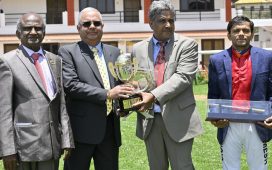Thursday’s announcement that live racing would be not be held at Laurel Park until further notice, with this weekend’s races cancelled and future racing moved to Pimlico Race Course, stemmed from concerns about the safety of the racetrack surface. Officials from the Maryland horse community appeared on a teleconference meeting to discuss the issues with the surface, which Racing Surfaces Testing Laboratory’s Dr. Mick Peterson believes may originate from a tough winter in the Mid-Atlantic region.
The entire track cushion will be rehabilitated in the coming weeks, with a timeline that is expected to take less than three weeks as light training (no workouts) continues over the Laurel Park main track. Meanwhile, horses will be able to ship to Pimlico for workouts using the Maryland Jockey Club shuttle.
Training tomorrow will be held from 5:00 a.m. to 8:30 a.m., with no break. Only jogging and galloping will be allowed at this time.
“From a race track operator’s perspective, we have a couple of responsibilities,” said Aiden Butler, Chief Operating Officer, 1/ST RACING. “The most important one is to make sure that the sanctity and the safety of the racetrack is the best it can be at all times. Varying degrees of weather and varying degrees of protocols mean that it’s not always as optimum as we would like … When we got the heads up last week that the track was not performing quite as well as we’d like it to, we immediately rallied and put a team together.
“We decided that for Maryland to be as good as it can be, there was only one approach, and it’s one that’s a heck of a lot of work, and unfortunately going to be a heck of a lot of inconvenience for everyone on this call. But there really is no other way. Maryland has the opportunity to be as good a racing jurisdiction and as good a racing surface as any in the country, and we’re not going to get there if the track isn’t as good as it can be.”
A total of four equine fatalities, one during racing and three during morning training, have occurred at Laurel this year, Stronach Group chief veterinary officer Dr. Dionne Benson told the Paulick Report. The four fatalities resulted from different types of injuries and occurred at different locations on the racetrack, Benson said, adding that the numbers are very similar to this time last year. One morning fatality occurred in February, the racing fatality on March 7, one morning fatality during March, and one morning fatality over the past week.
“The bigger issue was that we weren’t happy with how the track came out of winter,” Benson explained.
The general consensus was that the issues with the track surface have been a concern for the past two weeks.
“I don’t want to focus on how we got to this point,” said Maryland Thoroughbred Horsemen’s Association President Tim Keefe. “I would like to focus on how to avoid it in the future.”
Butler continued the conversation by adding that he’ll be on the grounds in Maryland over the next several weeks and is looking forward to speaking with horsemen, both formally and informally, about how to open a more direct dialog so similar issues can be avoided in the future.
“We definitely want to be proactive on this, not reactive,” said Peterson, adding that the MJC has implemented the some of the RSTL’s improvements over the past couple years, including an on-site weather station and other rapid-response testing abilities.
Peterson went on to explain that the issues with the Laurel Park track cushion stemmed from several factors.
“Winter racing on a dirt track is challenging, and it’s clear that in the Mid-Atlantic region, some years are more challenging than others,” Peterson said, “especially with these years where the freeze/thaw cycle leads to a lot of salt usage. The other challenge, and this is not unique to the Mid-Atlantic tracks, is getting consistent materials in the quantity required for racetrack maintenance.
“The key is not only meeting the immediate needs, but in changing the operation mode for the Maryland Jockey Club.”
1/ST RACING’s Senior Track Superintendent Dennis Moore and the Maryland Jockey Club’s Track Superintendent Chris Bosley have located a supplier and began the project on Friday, stripping material off the track. Moore has experience mixing the material on site for consistency, and will be confirming the process along the way with additional samples sent to the RSTL and Peterson.
New to the Paulick Report? Click here to sign up for our daily email newsletter to keep up on this and other stories happening in the Thoroughbred industry.
Copyright © 2021 Paulick Report.








